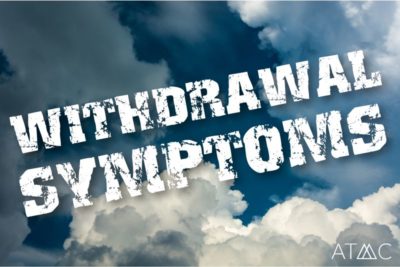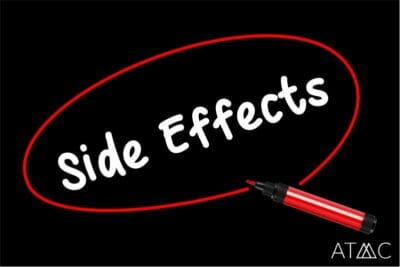Last Updated on September 19, 2022 by
Alternative to Meds Editorial Team
Medically Reviewed by Dr John Motl MD
Last Updated on September 19, 2022 by
Alternative to Meds Editorial Team
Medically Reviewed by Dr John Motl MD

The subject of neurotoxicity after lithium carbonate has been widely studied, as in the article authored by Netto and Phutane, published in the Primary Care Companion for CNS Disorders of 2012.18
The authors observed that reversible neurotoxic effects of lithium carbonate may be undetectable until the drug is discontinued. The study focused on 6 cases, a small cohort, and does acknowledge that in other cases, the neurotoxic effects of lithium carbonate will be irreversible.
A more recent study 14 coins the term “SILENT” to describe the Syndrome of Irreversible Lithium Effectuated Neurotoxicity. These are lithium carbonate neurotoxic side effects that don’t go away even though the drug is discontinued. The most common symptom of SILENT is cerebellar dysfunction, a form of brain damage affecting the cerebellum. The cerebellum is the coordinator for balance, gait, and can affect speech and other motor movements, as seen in muscular dystrophy, Parkinsonism, dementia, and other conditions. The authors of this study aim to bring the phenomena related to SILENT into increased awareness of physicians and clinicians, so these damaging effects can be prevented, not simply discovered after lithium carbonate withdrawal.15
Similarly, other side effects that emerged during treatment with lithium carbonate such as renal impairment, may not go away even after stopping lithium orotate.2,11
Lithium discontinuation is generally desired for avoiding acute immediate lithium side effects, as a result of the emergence of chronic long-term Lithium side effects, the emergence of new health conditions (cardio, renal, etc.) or to avoid potential injuries or harms related to pregnancy or breastfeeding. While the decision to quit Lithium may be medically sound, proper Lithium protocols can reduce or eliminate Lithium withdrawal symptoms that may otherwise present.
Mood stabilizers like lithium carbonate are known to impair liver and kidney function which would make anyone consider … is there a better way?

Abrupt lithium withdrawal in contrast to gradual tapering can cause pronounced episodes of returning mania 5 as well as bipolar relapses. Gradual withdrawal observed in clinical studies demonstrated fewer instances of returning symptoms, 4x fewer suicides compared to continuing the medication, and where symptoms did return, patients had less severe versions of their returning symptoms overall.6,17,22
No published clinical studies were found relating to withdrawal from natural lithium or lithium orotate. At times, a prescribing physician may choose to slowly convert their patient from the prescription form of lithium (lithium carbonate) to lithium orotate as a way to bridge off the drug. This technique involves gradually taking away the medication version and slowly introducing lithium orotate. This is a pragmatic route for many, but it should be discussed with your integrative medical doctor before attempting.
There are reasonable theories regarding the role of trace minerals in respect to mental health. Deficiencies can play a prominent role in preparing for and executing Lithium withdrawal. At the Alternative to Meds Center, pre-taper lab testing is done to establish whether such deficiencies exist and then programs a person for corrective supplementation and diet to resolve these. In general, improving nutrition is beneficial for anyone recovering from medication discontinuation.
It may be possible that a trace mineral deficient person (which is common due to over-farming techniques in agriculture) may respond positively to lithium. An unsubstantiated hypothesis may be that lithium could play a certain role in these deficiencies and possibly covering the function of other similar minerals. It could be argued that trace mineral supplementation could offer support and that the use of trace mineral supplementation during withdrawal may be of benefit. As this is a bit of a tenuous assertion, please discuss this with an appropriate doctor who has both knowledge of medications as well as supplemental methods before considering this protocol.
A case study published in the 2019 Journal of Advanced Mind-Body Medicine concluded that lifestyle interventions, as well as nutritional interventions, were important components of recovery and remission of symptoms in a medication withdrawal clinically supervised setting.19
The protocols that are used in Lithium withdrawal at Alternative to Meds can be reviewed on our services overview page.
Lab synthesized compounds are produced called lithium salts. Lithium salts such as Lithobid are prescribed for the treatment of mania, bipolar disorders, depression, and PTSD. Natural lithium supplements are available OTC. Prescribed as a mood stabilizer, Lithobid, Lithate, and other brand names, are synthesized forms of lithium that have been studied since FDA approval for their efficacy in treating certain disorders, as well as to explore the potential for unwanted side effects.1,2,13
Less information is available for clinical trials concerning the non-prescription form of lithium called lithium orotate. Lithium orotate is not available over-the-counter in all countries, due to concerns by regulators over hypothetical rather than observed toxicity dangers should the supplement be taken in extraordinarily large doses. One such occurrence was found in an article published in the Journal of Medical Toxicology, where a woman took 18 tablets (instead of one) of an over-the-counter lithium orotate supplement who became nauseous and experienced light hand tremors, both of which disappeared after 3 hours.20
Below is medical information concerning these and other topics related to lithium and may be helpful to those considering starting or stopping a prescription of this type of drug.
Lithium had been extensively used for the control of mania since the late 1870s but became an increasingly abandoned practice in psychiatry as new antipsychotic drugs were developed and approved by the FDA and around the world starting in the 1950s for the treatment of mania.3,4,21
Long-term studies on Lithium used in the treatment of mood disorders such as bipolar illness show a disappointing level of efficacy,23 so much so that some researchers consider the marketing of Lithium an overreach by pharmaceutical companies whose sole criteria is the profitability of such products.24
Lithium refers to the metal, or mineral, however, the word lithium has become synonymous (although not entirely accurate) with all the various compounds and salts that have been produced in pharmaceutical labs across the world. The natural form of the element is simply called lithium and is not patentable because it is a natural element found in mineral deposits in the earth. It is important to understand the nature and molecular structure of any drug or supplement that one takes.
Various forms of compounds and salts will contain lithium, synthesized using various types of binding agents, such as:
There have been many other compounds/mixtures produced over the last century and a half. Some of these were found to be toxic, as in the table salt version, and unsuitable for use in food products, as in the 7-UP soda pop of the 1950s. Some have survived and exist in pharmaceutical products used today.
Brand names include numerous examples such as Theralite, Efalith, Lito, Prolix, and hundreds of additional trade names.
A study out of Norway published in the BMC Journal of Psychiatry showed that a majority of the participants discontinued the prescription drug lithium carbonate to avoid the side effects of the drug. Diarrhea, tremors, diabetes insipidus, and weight gain were the 5 most common reasons for discontinuation according to the authors of the study.9
According to the FDA label 2 for lithium carbonate, signs of lithium toxicity include a similar list, including diarrhea, vomiting, tremors, ataxia (clumsiness, loss of coordination), drowsiness, and muscular weakness. Other common reasons for discontinuing the medication due to side effects, according to a study published in the International Journal of Bipolar Disorders11 include weight gain, cognitive impairment, impaired kidney function, hyperthyroidism, and hypothyroidism. Because of the vast number of potential side effects, we have categorized a sampling of them for clarity. These side effects along with many others are listed on the FDA drug label.
Gastrointestinal & Renal:
 Nausea, vomiting, diarrhea
Nausea, vomiting, diarrheaMusculoskeletal
Cognitive
Dermatological
Ocular/Aural
Other Conditions & Disorders
It is important to distinguish lithium orotate (non-prescription form) from lithium carbonate and other lithium (prescription-only) compounds when comparing and assessing their characteristics of safety and efficacy.
Below are some of the most frequently asked questions about lithium carbonate, lithium orotate, other mood-stabilizing prescription drugs, Lithium Carbonate drug interactions, and other topics.

Our goal is to help those who have been disappointed with the results of drug-based therapies by providing drug-free treatments. Many of these are listed on our services overview page. Prescription drugs may not have provided the relief that was hoped for, and may have introduced more problems than benefits. While drugs can be destructive, drugs can also have beneficial effects such as anesthesia or masking of emotional pain. But these temporary effects leave unresolved symptoms in place, with no curative result. These unresolved symptoms can be addressed using non-harmful methods and therapies for authentically restoring health and vibrancy. Nutrition, neurotoxin removal, counseling, lifestyle interventions, and other drug-free therapies may be of considerable benefit.
When needed, safe and gradual tapering is our specialty, and we have helped literally thousands of clients to achieve success in becoming drug-free, or as close to it as realistically possible. Please contact us for more information on how our programs may be beneficial to your specific health and wellness goals. Please ask us about insurance coverage when you call. You can find out more about safe Lithium withdrawal as well as methods to achieve sustainable mental health naturally today!.
1. Greenblatt J, Grossman K, “Lithium: The Untold Story of the Magic Mineral That Charges Cell Phones and Preserves Memory” Great Plains Laboratory Inc, 2017 Jan 23 [cited 2021 July 26]
2. FDA drug label Lithobid (lithium carbonate) [online 2009] [cited 2021 July 26]
3. Luo D et al., “Lithium for schizophrenia: supporting evidence from a 12-year nationwide health insurance database and from Akt1-deficient mouse and cellular models.” Nature Scientific Reports [online} Article No. 647 (2020) [cited 2021 July 26]
4. Mitchell PB, Dusan Hadzi-Pavlovic D “Lithium treatment for bipolar disorder” Bulletin of the World Health Organization, 2000 [cited 2021 July 26]
5. Mander AJ, Loudon JB “Rapid Recurrence of Mania Following Abrupt Discontinuation of Lithium” Lancet clinical trial report PMID 2898622 [1988 Jul 2] [cited 2021 July 26]
6. Faedda GL, Tondo L, Baldessarini RJ, Suppes T, Tohen M “Outcome After Rapid vs Gradual Discontinuation of Lithium Treatment in Bipolar Disorders” Arch Gen Psychiatry [1993 Jun] PMID8498879 [cited 2021 July 26]
7. Karatas F “An investigation of orotic acid levels in the breast milk of smoking and non-smoking mothers” European Journal of Clinical Nutrition, 2002 Nature Publishing Group [cited 2021 July 26]
8. “Medication Frequently Asked Questions.” National Alliance on Mental Health (N.D.) [cited 2021 July 26]
9. Ohland L, et al., “Reasons for lithium discontinuation in men and women with bipolar: a retrospective cohort study.” BMC Psychiatry {online} 2018 Feb 7 Article no. 37 (2018) [cited 2021 July 26]
10. FDA label Tegretol (carbamazepine) March 2018 [cited 2021 July 26]
11. Gitlin M. Lithium side effects and toxicity: prevalence and management strategies. Int J Bipolar Disord. 2016;4(1):27. doi:10.1186/s40345-016-0068-y [cited 2021 July 26]
12. LiverTox: Clinical and Research Information on Drug-Induced Liver Injury [Internet]. Bethesda (MD): National Institute of Diabetes and Digestive and Kidney Diseases; 2012-. Lithium. [Updated 2019 Jun 4]. Available from: https://www.ncbi.nlm.nih.gov/books/NBK547877/ [cited 2021 July 26]
13. Balon R, Yeragani VK, Pohl RB, Gershon S. Lithium discontinuation: withdrawal or relapse? Compr Psychiatry. 1988 May-Jun;29(3):330-4. doi: 10.1016/0010-440x(88)90056-9. PMID: 2897893. [cited 2021 July 26]
14. Adityanjee, Munshi, Kaizad R MD, DPH, MPH; Thampy, Anita MBBS The Syndrome of Lithium-Effectuated Neurotoxicity” published Journal of Clinical Neuropharmacology Jan-Feb 2001 Issue 1 pg 38-49 doi: 10.1097/01.wnf.0000150871.52253.b7 [cited 2021 July 26]
15. Ataullah AHM, Naqvi IA. Cerebellar Dysfunction. [Updated 2020 Sep 1]. In: StatPearls [Internet]. Treasure Island (FL): StatPearls Publishing; 2021 Jan-. Available from: https://www.ncbi.nlm.nih.gov/books/NBK562317/ [cited 2021 July 26]
16. Mander AJ, Loudon JB. Rapid recurrence of mania following abrupt discontinuation of lithium. Lancet. 1988 Jul 2;2(8601):15-7. doi: 10.1016/s0140-6736(88)92947-9. PMID: 2898622. [cited 2021 July 26]
17. Baldessarini RJ, Tondo L, Viguera AC. Discontinuing lithium maintenance treatment in bipolar disorders: risks and implications. Bipolar Disord. 1999 Sep;1(1):17-24. doi: 10.1034/j.1399-5618.1999.10106.x. PMID: 11256650. [cited 2021 July 26]
18. Netto I, Phutane VH. Reversible lithium neurotoxicity: review of the literatur. Prim Care Companion CNS Disord. 2012;14(1):PCC.11r01197. doi:10.4088/PCC.11r01197 [cited 2021 July 26]
19. Brogan K, Siefert A. Successful Discontinuation of Chronic Polypsychotropic Regimen and Resolution of Withdrawal Syndrome Through Nutrition and Lifestyle Interventions: A Case Report. Adv Mind Body Med. 2019 Summer;33(3):22-30. PMID: 31605602. [cited 2021 July 26]
20. Pauzé DK, Brooks DE. Lithium toxicity from an Internet dietary supplement. J Med Toxicol. 2007 Jun;3(2):61-2. doi: 10.1007/BF03160910. PMID: 18072162; PMCID: PMC3550087. [cited 2021 July 26]
21. Ramachandraiah CT, Subramaniam N, Tancer M. The story of antipsychotics: Past and present. Indian J Psychiatry. 2009;51(4):324-326. doi:10.4103/0019-5545.58304 [cited 2021 July 26]
22. Verdoux H, Bourgeois M. Conséquences à court terme de l’interruption d’un traitement par sels de lithium [Short-term sequelae of lithium discontinuation]. Encephale. 1993 Nov-Dec;19(6):645-50. French. PMID: 12404784. [cited 2022 Feb 15]
23. Qureshi MM, Young AH. Hamlet’s augury: how to manage discontinuation of mood stabilizers in bipolar disorder. Ther Adv Psychopharmacol. 2021;11:20451253211000612. Published 2021 Mar 15. doi:10.1177/20451253211000612 [cited 2022 Feb 15]
24. Healy D (2006) The Latest Mania: Selling Bipolar Disorder. PLoS Med 3(4): e185. https://doi.org/10.1371/journal.pmed.0030185 [cited 2022 Feb 15]
Originally Published Sep 13, 2018 by Diane Ridaeus

Dr. Motl is currently certified by the American Board of Psychiatry and Neurology in Psychiatry, and Board eligible in Neurology and licensed in the state of Arizona. He holds a Bachelor of Science degree with a major in biology and minors in chemistry and philosophy. He graduated from Creighton University School of Medicine with a Doctor of Medicine. Dr. Motl has studied Medical Acupuncture at the Colorado School of Traditional Chinese Medicine and at U.C.L.A.

Diane is an avid supporter and researcher of natural mental health strategies. Diane received her medical writing and science communication certification through Stanford University and has published over 3 million words on the topics of holistic health, addiction, recovery, and alternative medicine. She has proudly worked with the Alternative to Meds Center since its inception and is grateful for the opportunity to help the founding members develop this world-class center that has helped so many thousands regain natural mental health.

Can you imagine being free from medications, addictive drugs, and alcohol? This is our goal and we are proving it is possible every day!
Read All StoriesView All Videos